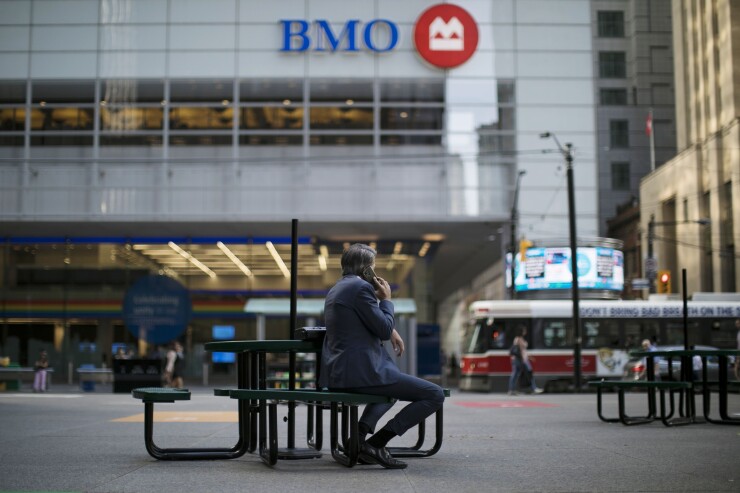
UPDATE: This article includes additional information from BMO's call with analysts.
BMO Financial Group's credit performance was worse than expected during fiscal year 2024, and the bank warned that impaired loan losses may still be a headwind in the new year.
The Toronto-based bank, which has been plagued by credit challenges for several months, set aside 1.5 billion Canadian dollars ($1 billion) for potential loan losses during its fourth quarter, which ended Oct. 31. That's more than three times what it set aside in the year-ago period and marks the fourth consecutive time BMO has
During BMO's fourth-quarter earnings conference call on Thursday, executives told analysts that provisions will probably remain elevated for the time being, although the fourth quarter was likely the high point and the amount set aside for souring loans should begin to moderate sometime in 2025.
"Credit performance deteriorated more than we anticipated [and] impaired loss rates exceeded our historical range, impacting our overall results," CEO Darryl White said on the call.
Still, "we do believe that our credit is contained," he said.
At least one analyst indicated that BMO needs to show, not tell. In a research note following the call, Jefferies analyst John Aiken wrote that "until BMO can demonstrate that … its provisions will decline materially, we anticipate that its relative valuation will be mired by a pessimistic outlook."
In August, Aiken downgraded BMO from "buy" to "hold" in response to the company's third-quarter results. He maintained that position on Thursday.
BMO, the third-largest Canadian bank by assets, wasn't alone in boosting provisions during the quarter. Its peers TD Bank Group and Royal Bank of Canada increased provisions for potential credit losses during the three-month period, while Scotiabank's provisions fell year over year.
Despite the added provisions, BMO's net income was CA$2.3 billion, up from CA$1.7 billion in the year-ago period. At the same time, earnings per share totaled CA$2.94, falling short of analysts' expectations of CA$3.44, according to S&P Capital IQ.
Analysts spent part of Thursday's call peppering White and Chief Risk Officer Piyush Agrawal with credit-related questions. Gabriel Dechaine, an analyst at National Bank Financial, wanted to know how BMO expects its impaired loss ratio to play out in 2025.
The ratio, which measures provisions to impaired loans to average net loans, was 0.66% during the fourth quarter, up from 0.25% in the year-ago period. It was 0.47% for the full fiscal year.
The company said it is forecasting a ratio in the high 40% range for fiscal year 2025, similar to the recently completed fiscal year.
Agrawal said the bank "has done a granular review" of the loan portfolio and he, too, has looked at the "top watchlist" as well as the top impaired loans.
"It gives me confidence as we go into 2025 that [the impaired loss ratio] should be climbing down from where we were at the end of" the fourth quarter, he said.
Much of BMO's future success will depend on how its U.S. operations perform. White said the company has been hampered for the past two years by a "weaker banking environment" in the U.S. that resulted in "lower-than-expected business activity and balance sheet growth."
Loan growth has been muted stateside. But "since the election, we've seen pretty broad-based optimism in our client base," White said.
The Los Angeles-based subsidiary of Royal Bank of Canada posted its strongest performance in six quarters.
The U.S. business, which expanded with the
Average loans in the U.S. were about CA$205 billion, down from $208.5 billion in the year-ago quarter.
Still, with an improving environment, "revenue synergies are on track and building," White said.
BMO said on Thursday that it plans to repurchase as many as 20 million common shares for cancellation. The deal must be approved by the Office of the Superintendent of Financial Institutions and the Toronto Stock Exchange, the company said.
When the buybacks happen and how many shares are repurchased depend on regulatory approvals and management discretion based on market conditions and capital levels, BMO said.
In another boost for shareholders, BMO increased its first-quarter dividend by 5% from a year ago to CA$1.59.
As of midday Thursday, BMO shares were up about 2.9% on the New York Stock Exchange.






